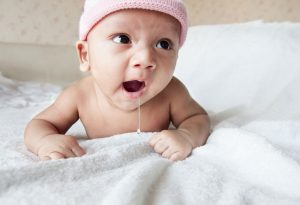In this Article
When the saliva flows out of a person’s mouth unintentionally, it is known as drooling. We have six salivary glands that produce saliva for us and when excess saliva is produced, we tend to drool. Drooling is a common occurrence in babies. Babies start drooling at about 3 months of age. Some babies drool a bit, while others drool a lot. If you see your baby drooling excessively, it could be due to the underdeveloped muscles in his mouth or excess production of saliva in his mouth. But there is nothing to worry about, as drooling is a part of his physical development.
Is Drooling Common in Babies?
It is common for babies to drool and a baby might drool for the first two years of his life. As an infant is not in complete control of the function of swallowing and his mouth muscles, he may drool, even while asleep. If your baby has started drooling, you can expect this condition to continue until he turns 18 to 24 months old. Drooling is quite common during the teething period, so be ready to change your baby’s clothes about 5-6 times in a day. It is quite common for babies to drool. But if a child drools even after the age of four years, then it is not normal.
Drooling in Babies Between 1 and 24 Months of Age
Drooling in babies is normal and it even helps in their development. A baby may drool slightly to excessively at different stages of his life and as he grows.
1. 1-3 Months
When a baby is between 1 and 3 months of age, he may not drool at all. Drooling is rare at this time as a baby is always in a face-up position. So he may not drool during this time or even after that. But some babies may start drooling by 3 months of age.
2. 6 Months
By this time, drooling is slightly more controlled but it continues when the baby babbles or puts toys in his mouth. Usually, babies start teething by this time, hence they drool.
3. 9 Months
By this stage, babies start rolling over and crawling. They may continue to drool as they are still teething. Teething can stimulate drooling.
4. 15 Months
By 15 months of age, most babies start walking and running, but they may not drool while they walk or run. However, if they indulge in activities or tasks which require concentration, they may drool.
5. 18 Months
Babies will not drool while indulging in regular activities or in activities that promote fine motor skills. But they may drool while they are being fed or are dressing.
6. 24 Months
By this time, drooling is minimal in babies. It is almost non-existent.
Does Drooling Play an Important Role in Baby’s Development?
Yes, drooling does play an important role in the growth and development of a baby. Drooling is a sign of teething in a baby. Drooling and blowing bubbles are also a sign of physical development in toddlers. If your little one drools or blows bubbles, then it is a sign that he has entered a new period of growth. If your baby drools after smelling milk or food, you should know that his sense of smell is growing.
Drool contains enzymes which are useful for the baby to digest semi-solid or solid food when he is between 4 and 6 months of age. Saliva neutralizes the stomach acid and it helps in developing the baby’s intestinal lining fully and protect the lining of the oesophagus from irritation. Saliva also helps bind the food together due to its slick nature that facilitates swallowing.

What Is Excessive Drooling in Babies?
When there is an involuntary flow of saliva from a baby’s mouth after he has passed the normal age of drooling, it can be termed as excessive drooling. If your little one drools a lot after he has crossed the age of 2 years, you should consult a doctor for the same. Although it is often attributed to over-production of saliva, excessive drooling happens because of poor coordination between mouth and tongue. This lack of coordination can result in bad swallowing.
What Are the Causes of Excessive Drooling in Infants?
Excessive drooling in babies and toddlers is caused due to the following reasons:
1. Teething
Although babies don’t have a tooth by the age of 6-8 months, the teething process begins quite early. This is the reason why they start drooling as early as 3 months of age. When the teething phase begins, there is excess production of saliva and they may drool excessively when a tooth pushes its way through the gums.
2. Open Mouth Posture
If a baby has a habit of keeping his mouth open for a longer period of time, he might drool. If your little one keeps his mouth open for long due to a blocked nose or plainly out of habit, then he may not be able to swallow the saliva at regular intervals and hence may drool.
3. Staying Focused For Long
When babies and young children concentrate on a particular task their mind gets stimulated. On stimulation, the saliva production increases six-fold. During infancy, their ability to swallow excess saliva is inadequate. And when they focus on a task their attention is diverted from mouth position and tongue movements, and as a result, this results in drooling.
4. Food
Release of saliva from glands inside mouth is in response to taste sensation on eating variety of foods. Eating sour or spicy foods lead to the release of saliva excessively. If your kid eats foods spicy foods or fruits such as oranges, lime, grapes, he may salivate excessively.
5. Neurological Disorders
Many neurological disorders like Bell’s palsy and Cerebral Palsy display symptoms like drooling and excessive salivating. Bell’s palsy is a temporary nerve condition which impacts one portion of the face. Diseases affecting the brain like cerebral palsy, Bell’s palsy, and Wilson’s disease affect the muscle control, which thus causes difficulty in swallowing, pooling of saliva in the mouth, and abnormal lip position, all of which may lead to drooling.
6. Side Effects of Medication
Some medications including drugs used to induce sleep and reduce pain, and drug used for eye checkup in children or even in mother of breastfed babies can cause increased saliva production. Heavy metal poisoning can also cause hypersalivation, which can cause drooling in babies.
Treatment for Drooling
It is normal for babies to drool and drooling is an important part of physical development and growing up in babies. However, it is not normal if they drool once they turn 2 years of age. If your toddler drools even after 2 years of age, you should not take it lightly. You should consult a doctor as it needs medical attention. If your child is drooling excessively, consult a doctor immediately as it might affect his social life and his day-to-day activities may get affected. If your little one drools a lot, your child’s doctor will look for following signs to come to a conclusion and suggest a treatment for the same.
• If your child can seal his lips properly and move the tongue around.
• If your child is swallowing normally.
• If he has a stuffy or blocked nose.
• If the child has a natural swallowing reflex.
• The posture of the child and whether his jaw is firm or not.

Post these evaluations, the following line of treatment is followed:
• Helping the child to practice a closed-lip stance.
• Reducing acidic food from the child’s diet.
• Working on the child’s capacity to swallow.
• Tightening of face muscles.
• Improving oral-sensory awareness to help the child understand when his mouth or face is wet.
• Oral motor therapy to strengthen his jaw, cheeks, and lips. This therapy will help him swallow his saliva properly.
What Is a Drool Rash?
Due to the constant dribbling of saliva through the mouth, a baby’s lower lips, cheeks, neck, and chest may show signs of skin irritation. If your baby drools excessively, the saliva will come on to his cheeks, neck or chest, and you might notice red, uneven rashes in these areas. If the rash from drooling is around a baby’s mouth, it is known as a drool rash. To treat drool rash, you must wash the affected area properly, pat it dry, and apply a lanolin-based cream. You can tie a bib around your baby’s neck to keep the drool from spreading on to the neck and chest area. You can even apply petroleum jelly on the affected area to keep it moisturised and to help it heal quickly. However, speak to your doctor before applying any creams or lotions on your baby’s skin.
When to Consult a Doctor
You should consult a doctor if your child drools even after he crosses the age of four. Uncontrollable drooling that is caused by medical conditions can be addressed by consulting a paediatrician. Talk to your baby’s doctor – he might suggest therapy or medication. However, if the therapy or medication is unable to provide relief, you should consider a higher level of treatment.
Drooling is a natural way of helping the baby to moisten and soften solid foods and makes it easy to swallow the food. Although it fulfils many important functions for the baby, keep a close watch if drooling increases and shows no signs of abating after the age of four. Get medical attention to address the problem before it worsens.









